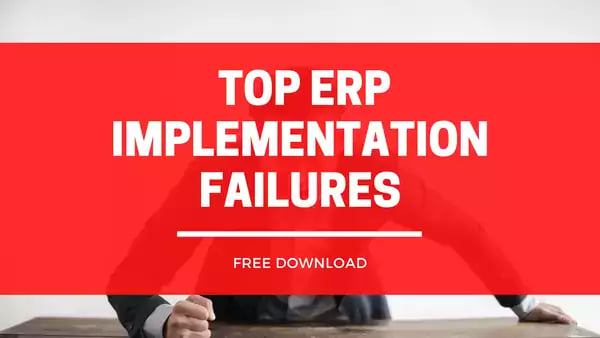ERP systems such as SAP, Netsuite and Microsoft Dynamics require a certain level of planning and coordination to build and maintain. When implemented correctly, ERP systems can make your business more efficient and save you time.
There are many reasons why ERP implementation may fail, but it is often due to misalignment of business objectives and technology. Unfortunately, many ERP design decisions are driven by short-term financial considerations and have little relevance to the long-term success of an organization.
In this post, we’ll dive into the main reasons that ERP implementation projects fail and share best practices for preventing project problems during an ERP implementation.
We offer many free resources at ERP Research which can help you to have a successful ERP project, by planning effectively. These resources include:
To learn about real life ERP implementation case studies, download our case study report below, covering ERP implementations such as Nike, Lidl, Hersheys and more:

1. Lack of Ownership of the Project

ERP implementation is a significant IT project management task. In most cases, the owner(s) of the projects do not own the underlying data and resources. Instead, they delegate organizational responsibility for ERP implementation to different IT departments. As a result, ERP implementation fails if there is no clear chain of command and management such as the delegating department lacks ownership of the project. This lack of ownership causes confusion and leads to repeated ERP implementation problems.
2. Rushing the Implementation

Rushing the evaluation and implementation of an ERP project is one of the main causes of failure. During evaluation, it's key to follow a set list of ERP evaluation criteria and stick to it. This will help you to ensure you select the best software and implementation partner, whether it be SAP, Oracle, Microsoft, Netsuite, Infor, Acumatica, Sage or another.
During implementation, the ERP project team should remain focused on meeting deadlines and conducting quality assurance studies as documented in the ERP Standard Operating Procedure (SOP). To help ensure successful ERP implementation and improvement, it is important to release new products only when there are known bugs and to collect information from end-users before rollouts - ensure all stakeholders are kept up to date.
3. No Scope of Delivery

If an ERP implementation ever seems like it might stay on track and be successful, one of the most common reasons why it doesn’t is because the scope of delivery has never been set.
In an ERP implementation, ‘Scope of Delivery’ is the programmatic definition of what the end-to-end functionality of the system should be.
To avoid this, it's best to map out your ERP requirements long before you start your ERP evaluation or implementation process.
Now, this definition may change from implementation to implementation because the delivery is undertaken by different parties with different levels of skill, knowledge, expertise, and resources. But, the scope of delivery is an integral part of every ERP implementation and should not be left to the discretion of only those implementing the ERP system. Instead, it should be treated as a collaborative ‘statement of direction’. If this definition is given to you by your ERP Platform provider without any modification or qualification, then there is no scope for the implementation to yield profits and increase customer satisfaction.
When a project is initially deployed to the ERP system, it enables a scope of delivery for completing the project in the time frame and then some. In a nutshell, it enables the party implementing it to constrain who can actually use it until everything is deployed and functional.
4. Underestimating the Preliminary Work

ERP implementation is an intricate process of designing, implementing, and maintaining an information system capable of handling your organization’s needs. There are many moving components that must work together to support business continuity, ranging from hardware to software to data processing. Many IT departments underestimate the amount of work that goes into ERP implementation. This is not to say that you do not need to do this preliminary work, but it is a mistake to assume that ERP implementation is easy or that doing ERP implementation takes no time at all.
Kick off your ERP project the right way by using our free ERP requirements template below:

5. ERP is treated as an IT Project
When it comes to ERP, many projects are treated as IT projects due to their complexity rather than an information organization system. These projects contain information technology (IT), computer systems, and other resources needed to deliver the desired result. Although ERP is commonly implemented as a software system or a hardware system, its actual implementation is rarely seen as an IT project in its own right. ERP module implementation is treated as an IT project because it requires both technical inputs, as well as organizational coordination and implementation.
The most common failures due to this incorrect designation include:
- The relative complexity of ERP challenges makes it difficult to assess its potential impact on the operability of other applications.
- Because ERP applications integrate with each other so closely, implementation failures can cause cascading failures within an ERP implementation.
- ERP applications are typically subjected to more impulsive upgrades that result in design changes and/or operational modifications that are more difficult to incorporate into other applications.
- ERP system integrations are typically dependent on the quality and emergence of new technologies so they're particularly vulnerable to disruptions caused by network disruptions or human error.
- Although ERP project management activities are organized into functional roles -primary, secondary, and tertiary implementers--they're really just about managing the items.
6. Not Enough Testing or Validation

One of the most common mistakes commonly associated with ERP implementation is that the team did not follow the proper validation and testing processes. The ERP applications are supposed to undergo at least one round of validation. In most cases, it was not done properly.
It is because organizations don't test their solution before rollout that they cannot gather critical data on the effectiveness of their application. Without proper test data, it’s hard to tell if your software actually delivered what was promised. And even with proper test data, without adequate validation and reporting analysis, it’s hard to determine if anything needs amending.
7. “One-off Project” Mind-set

In reality, an ERP implementation is a long-term strategic project whose operational success will have long-term effects on the business. The fundamental problem in ERP implementation is many organizations think of it as only a one-off project.
It's important to realize that while an ERP implementation may seem like a single “one-off” but is really a number of projects, each with its own setup procedures, implementation schedules, queries, build systems that require its own management and audit.
8. Lack of Planning and Resource Management

Process failures are inevitable in any system with a known or unknown history of failures. ERP implementation is no exception, with a common cause for failure consistently found to be insufficient planning and resource management.
A major issue with implementing any hardware or software is procuring the necessary resources - hardware and software - along with the appropriate network architecture, custom development tools, and skilled staff.
In delivering an ERP solution to your internal users, you must go through the same process of defining your requirements, selecting components, and creating a design plan. Regardless of the context though, ERP system failure can be highly disruptive in organizations. ERP implementation failure generally results from inadequate planning and resource management, coupled with a lack of awareness regarding risks. This failure can happen at multiple levels, including critical business processes that can overwhelm a technical team's ability to manage risks and manage change effectively.
ERP Implementation Failure Case Studies
To learn more about specific ERP implementation failure case studies, check out our ERP implementation failure case study here.
We review some of the biggest ERP implementation failures including Lidl, Nike, Hersheys and more.
How To Overcome ERP Implementation Failure
Most ERP implementation failures have one thing in common: lack of forethought.
While ERP is an important part of any business infrastructure, most businesses fail at implementation because they do not have a strategy in place to handle the unexpected.
Think about the ERP system expectations beforehand - where they come from, how they work, and how they can be deployed. Without a solid understanding of the ERP implementation process, this type of incident can happen - causing critical business processes to be disrupted during a fragile time of operational change.